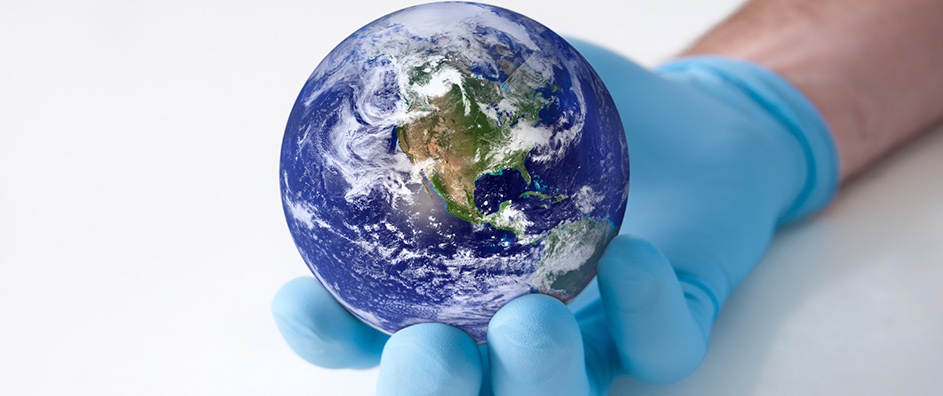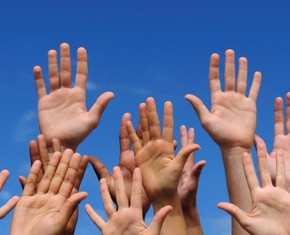The views expressed in our content reflect individual perspectives and do not represent the authoritative views of the Baha'i Faith.
The Baha’i teachings promise humanity a united world, free of warfare.
In that future state of society, the Guardian of the Baha’i Faith wrote, we will use the huge monetary and human resources previously expended on war to extend the reach of science, enhance public health and wipe out disease:
The enormous energy dissipated and wasted on war, whether economic or political, will be consecrated to such ends as will extend the range of human inventions and technical development, to the increase of the productivity of mankind, to the extermination of disease, to the extension of scientific research, to the raising of the standard of physical health, to the sharpening and refinement of the human brain, to the exploitation of the unused and unsuspected resources of the planet, to the prolongation of human life, and to the furtherance of any other agency that can stimulate the intellectual, the moral, and spiritual life of the entire human race. – Shoghi Effendi, The World Order of Baha’u’llah, p. 204.
“The prolongation of human life,” Shoghi Effendi says, outlining one of the over-arching goals of the Baha’i teachings. Baha’is believe that every human being has the right to a full and healthy life.
The same major objective, number six in the eight UN Millennium Development Goals, has inspired and guided global medicine and public health efforts for the past decade and a half. That goal—combatting HIV/AIDS, malaria and other diseases—means mounting a well-funded, worldwide assault on the planet’s most deadly maladies and extending human life as much as possible.
So how did we do, as a worldwide community over the past 15 years, in fighting these diseases? Quite well, it turns out:
New HIV infections fell by approximately 40 per cent between 2000 and 2013, from an estimated 3.5 million cases to 2.1 million.
By June 2014, 13.6 million people living with HIV were receiving antiretroviral therapy (ART) globally, an immense increase from just 800,000 in 2003. ART averted 7.6 million deaths from AIDS between 1995 and 2013.
Over 6.2 million malaria deaths have been averted between 2000 and 2015, primarily of children under five years of age in sub-Saharan Africa. The global malaria incidence rate has fallen by an estimated 37 per cent and the mortality rate by 58 per cent.
Between 2000 and 2013, tuberculosis prevention, diagnosis and treatment interventions saved an estimated 37 million lives. The tuberculosis mortality rate fell by 45 per cent and the prevalence rate by 41 per cent between 1990 and 2013.
We did not, on the other hand, find cures yet for HIV/AIDS, malaria, tuberculosis or emerging diseases like the Ebola virus. We did not solve the crisis of the 17 million AIDS orphans in Africa. We did not wipe out any of these endemic, killer ailments, as we did with smallpox and nearly have with polio. To do those things, we need an increased level of unity of purpose among nations; predictable and consistent funding for disease prevention and treatment efforts; and a new, heightened global sense of the oneness of humanity. To do those things we will need, more than anything else, to end our enormous expenditures for creating death and devote them to creating and sustaining life. It’s a simple equation: if we stop wars, we can stop disease.
Also—and this subject rarely gets discussed—we need a vastly-increased and enhanced system of education about diseases and the basic steps necessary to prevent them:
In sub-Saharan African countries with available data, only 30 per cent of young women and 37 per cent of young men had comprehensive correct knowledge of HIV in 2014. This represents an increase of less than 10 percentage points since 2000 for both groups.
Furthermore, disparities in the level of comprehensive correct knowledge about HIV among women and men aged 15 to 24 persist by income and location. The disparity in knowledge between those living in the poorest and those in the richest households is 17 per cent versus 35 per cent for young women, and 25 per cent versus 48 per cent for young men. Similarly, the disparity in knowledge between those living in rural and urban areas is 23 per cent versus 36 per cent for young women and 32 per cent versus 46 per cent for young men. – from the UN MDG Report
This increased health education not only calls for a rapid rise in the number and quality of schools, but in the quality of the instruction in every school. That means focusing on and teaching the science of disease and its transmission, without shame, judgment or condemnation.
It also means educating the world about the needs of its most susceptible populations. When the world gradually learned, largely through the media-intensive efforts of international NGOs and public health organizations, that most malaria transmission could be avoided with the use of insecticide-treated bednets, it freely delivered more than 900 million insecticide-treated mosquito nets to malaria-endemic countries in sub-Saharan Africa between 2004 and 2014, saving the lives of millions.
That level of humanitarian and spiritual altruism and concern, common to good people everywhere, shows what we can do as a global community when we understand the problems and can identify the solutions. It shows what we can do when we prioritize kindness over hostility:
To every human being must ye be infinitely kind. Call none a stranger; think none to be your foe. Be ye as if all men were your close kin and honoured friends. Walk ye in such wise that this fleeting world will change into a splendour and this dismal heap of dust become a palace of delights. – Abdu’l-Baha, Selections from the Writings of Abdu’l-Baha, p. 280.
Next: Our Biggest Unmet Challenge: Sustaining the Earth
















Comments
Sign in or create an account
Continue with Googleor